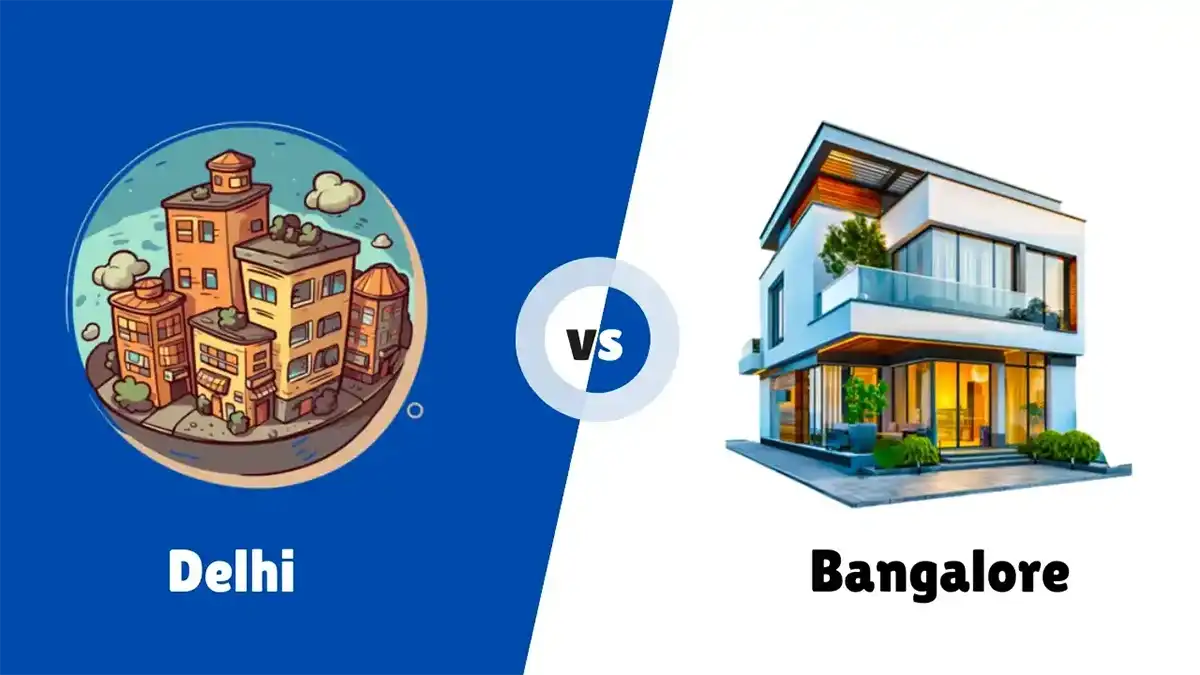Deciding which city to live in can be a significant decision, especially when choosing between two of India’s most popular cities: Delhi vs Bangalore. Both cities are major economic powerhouses, each offering a unique set of characteristics. In this post, we’ll compare Delhi vs Bangalore across key factors such as cost of living, rental prices, infrastructure, weather, and more, to help you make an informed choice.
See also: Brookefield Bangalore: A Premium Residential & IT Hub in East Bengaluru
Delhi vs Bangalore: Real Estate and Living Comparison
The capital city, New Delhi, is full of life and a manifestation of Indian tradition, culture, and energy. It is a city that is all about juxtaposing the past to the present as the Mughal structures co exist with the modern day structures. On the other hand, Bangalore is the tech city – much more contended, composed, and innovative tech-savvy city. Famous for its temperate climate and budding entrepreneurial environment, it’s home to the freshest faces of the working scene.
While Delhi offers a taste of both the history and minute speedy rhythm of today’s megapolis, Bangalore captivates with its flavors of relaxed tropical climate and vibrant technology hub emerging before the eyes. These two cities may be worlds apart, but they represent the India of the 21st century.
Now, let’s compare.
1. Area
Delhi: The Metro area of Delhi lies over about 1484 square kilometers and hence, it is considered one of the biggest metropolitan cities in India. Delhi is divided into urbanized zones and larger suburban districts and is highly populated mainly in New Delhi, South Delhi zones, Dwarka zone and Rohini zone as well. It is defined by infrastructure and city’s outreach.
Bangalore: Compared to Delhi, Bangalore, or Bengaluru, takes up significantly less space, it is approximately as vast as 741 sq km. Feeling that Bangalore is geographically relatively smaller than some other Indian cities, it has relatively high population density, with higher densities in core business areas, such as Koramangal, Whitefield, and Electronic City due to the rapid growth of the IT and start-up industries. The city has been spreading outwards at a fast pace due to the growth in suburban areas like Yelahanka and Devanahalli.
Verdict: In terms of sheer size, Delhi is almost twice the area of Bangalore, offering more space but also dealing with greater urban sprawl and congestion. Bangalore, though smaller, is highly urbanized and densely populated, especially within its IT hubs.
2. Weather and Climate
Delhi: Like most of the northern parts of India, Delhi has extreme weathers in summer, it rises up to 45 C, while winter has lows of 5 C at times. The monsoons are welcome with open arms but often they bring in humidity too and that with full force.
Bangalore: Bangalore has a more temperate climate that is always moderate weather that is suitable for most of the climatic activities. The climate is between 59°F and 95°F, monsoon also masks the heat with a little precipitation.
Verdict: As for the weather, Bangalore has much more favorable and comfortable climate compared to other Indian cities during the whole year.
3. Infrastructure
Delhi: Delhi has good transport facilities like Delhi Metro, wide roads and already vast numbers of flyovers. The city also enjoys better quality water and electricity source than many other metros. It is quite clear that the city benefits from better quality water and electricity supplies than many other metros.
Bangalore: In the recent past, Bangalore has developed a good infrastructure compared to the past but yet still it seems to be behind Delhi in some aspects. Outskirts roads infrastructure is often bad, and the city’s infrastructure is stretched because of population increase.
Verdict: Delhi offers superior infrastructure compared to Bangalore.
4. Cost of Living: Delhi vs Bangalore
Delhi: The cost however is slightly lower as compared to other major metro cities including the capital city of Delhi. Some of the basic needs such as food products, eating out and other local facilities are not expensive. That being said, luxury in certain sections of the city such as; South Delhi or New Delhi can be relatively costly.
Bangalore: Bangalore which is popularly called as the “The silicon valley of India” the cost of living is slightly on the higher side due to the growing technocrats in the city. Local markets, and cuisine in mid-range restaurants are still cheap and easily available, however, high end groceries as well as fine dining are costly.
Verdict: For anything in and around the middle in terms of prices, Delhi is marginally better.
5. Cost of Rental Properties
Delhi: Rental charges in Delhi depend on geographical location of the house or the rooms to be rented out. For instance, some parts, for example, Vasant Vihar and Hauz Khas require high rents while some parts of town like Dwarka or Rohini do not. Ideally 2BHK in Delhi would be costing between Rs 25000/- to Rs 50000/-according to the area it is located in.
Bangalore: IT sector dominates Bangalore’s rentals and is therefore slightly on the lower side. Preferred locations are Koramangala, Indiranagar and Whitefield are expensive, for example 2BHK varies from ₹30,000 to ₹60,000 per month. Locality like Yelahanka or Kanakapura Road have cheaper houses as compared to central or city area of Bangalore.
Verdict: Budget wise, Delhi is slightly more lenient for renters across different regions.
6. Cost of Utilities: Delhi vs Bangalore
Delhi: In terms of utilities, which includes electricity, water, and internet, for instance, are cheap more than Bangalore, in Delhi. But in Northern regions such as Delhi people can spend less during winters as the electricity bills are low as compared to southern cities.
Bangalore: Accordingly, utility costs particularly the electricity are relatively high in Bangalore because mostly the month requires an air condition since the climate is warm. Things like the use of the Internet and water can almost be on the same level but may slightly be a bit higher.
Verdict: Delhi is also relatively cheaper than many other cities because the prices of utility services are relatively cheaper.
7. Economic Opportunities
Delhi: Delhi, as the capital, is endowed with a great market that has many openings in government, manufacture, retail, and service industries. It is also politically charged as being the political capital, which offers a bonus in terms of policymaking.
Bangalore: There is no doubt that Bangalore is currently the leading IT city of India and is home to a plethora of tech, startup, and innovation. It also propels multinational corporations and investors making the place a center for career advancement in the information technology field.
Verdict: Whereas, one can find diversification in the opportunities in Delhi, the place suited for the tech and start-up world is Bangalore.
8. Traffic and Transportation
Delhi: Delhi is huge city and it experiences a heavy traffic jam most particularly the morning and evening rush hours. However, the Delhi Metro – considered one of the largest in India – is a good option to road transport. City public transport is comprised of buses and autos facilitating the movement across the city.
Bangalore: Believe it or not, traffic is a major problem in Bangalore as everybody knows. As a result of the increased pace of urbanization and the growth of the information and communications technologies industry, the density of traffic is high. While the Bangalore Metro is expanding to urbanize the city further; it is much less connected than Delhi’s metro. Public means are available but very often full and uncomfortable as well as slow also.
Verdict: Delhi provides proper transport facilities for travelling in the city, whereas Bangalore experience has revealed that traffic management could be very tight.
9. Medical Expenses Comparison
Delhi: Since Delhi is the capital, there is a great number of hospitals from the center’s All India Institute to private clinics of Fortis and Max Healthcare. Prices differ; the former is cheaper than the latter, but governmental facilities are usually less expensive but are prevalent.
Bangalore: Bangalore also got good health facility and more important with special hospitals like Manipal, Narayana Health, and Apollo. Medical facilities are slightly higher than those of Delhi, but most private treatments are similar, and some services are relatively more expensive due to popularity.
Verdict: Both cities offer excellent healthcare options, but Delhi may have slightly more affordable care through government hospitals.
10. Educational Institutions
Delhi: Delhi being the capital, houses some of the better colleges in India including Delhi University, Jawaharlal Nehru University and some well known school like Modern School and DPS.
Bangalore: Known for being the source for some of the best engineering and managerial diary assets in India containing the reputed institutions like II Sc, IIM – Bangalore and many international schools. The cosmopolitan nature of the city makes it possible for students from all parts of the world to live in the city.
Verdict: Both cities are academic hubs, but Delhi offers a more diverse range of educational institutions.
11. Pollution: Delhi vs Bangalore
Delhi: Delhi struggles with severe air pollution, particularly during winter, with hazardous AQI levels caused by vehicular emissions, industrial pollutants, and crop burning. The Yamuna River is heavily polluted, and noise pollution from traffic and construction is a constant issue. Waste management is also poor, with overflowing landfills.
Bangalore: Bangalore’s air quality is better, though rising traffic and urbanization are increasing pollution. Water pollution in lakes like Bellandur is a concern, but the city’s green cover and initiatives for waste segregation make it more manageable. Noise pollution is moderate but less intense than Delhi.
Verdict: When it comes to pollution, Bangalore is the better option. Delhi faces extreme air and water pollution, with frequent hazardous conditions impacting public health. Bangalore, while not perfect, has comparatively better air quality, less severe water pollution, and a more organized waste management system. For those concerned about pollution levels, Bangalore offers a healthier living environment than Delhi. We have a blog in detail related to pollution comparison between Delhi and Bangalore.
Bangalore vs Delhi: Which City is Right for You?
Choose Delhi: if you prioritize lower rent, more affordable cost of living, better infrastructure, and access to government and traditional business sectors.
Choose Bangalore: if you prefer a more temperate climate, scenic surroundings, and career opportunities in the tech industry.
Ultimately, the choice between Delhi and Bangalore depends on your personal priorities. Both cities offer unique advantages and cater to different lifestyles.
Ultimately, the best choice between Delhi and Bangalore depends on your individual preferences, lifestyle, and budget. Consider factors such as:
- Lifestyle: Do you prefer a bustling city with a rich cultural heritage or a more laid-back atmosphere?
- Career: Which city offers better job opportunities in your field?
- Budget: Can you afford the cost of living and housing in your preferred city?
- Future plans: Are you looking for a long-term investment or a temporary stay?
By carefully evaluating these factors, you can make an informed decision about whether Delhi or Bangalore is the right city for you.


